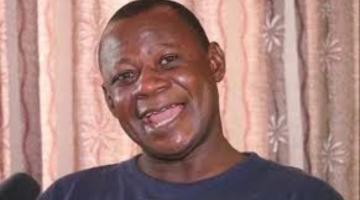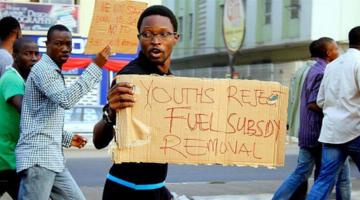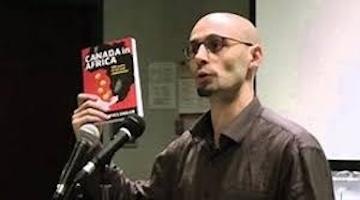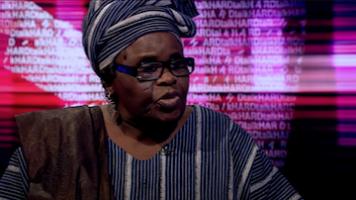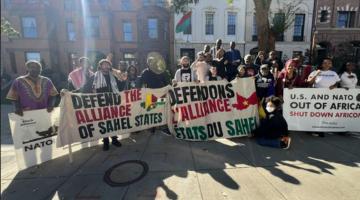Joel Odigie speaks during a side event organised by trade unions to coincide with the G7 Ministers’ Meeting on Climate, Energy and Environment in Turin, Italy held between 28 – 30 April 2024.
As workers across Africa face growing challenges, the leadership of the African Regional Organisation of the International Trade Union Confederation remains crucial in the fight for labor rights and social justice. This profile explores their vision for a fairer future amid rising inequality and economic uncertainty.
Originally published in Equal Times.
Akhator Joel Odigie was elected as general secretary of ITUC-Africa in November 2023, the pan-Africa body that is headquartered in Lomé, Togo and represents over 17 million members and 107 affiliated trade union centres in 52 African countries. With a stated mission to “represent workers in Africa through unity, advocacy, and capacity development to achieve decent work and equality for social justice”, ITUC-Africa plays an active role in defending the interests of workers across the continent, even though some 83 per cent of workers on the continent are informal. With his plans to “improve [the] defence and protection of workers’ rights and drive trade union regeneration” laid out in ITUC-Africa’s October 2024 Kigali Declaration on Organizing and Collective Bargaining for African Trade Unions, Odigie speaks to Equal Times about some of the challenges and opportunities facing Africa’s labour movement.
You have been general secretary of ITUC-Africa for a year and a half now. How does it feel leading Africa’s workers at this very tumultuous time in world history?
Indeed, these are difficult times. A lot of things are happening – politically, socially, economically. But those of us in leadership positions are elected to do hard jobs. We know that it is difficult and so we embrace the challenge. We do not have the luxury of lamentation. It is also true that many of the issues that we are facing are not new; it’s just that the situation has intensified. The emergence of Trump in the United States and his policies are having reverberating effects globally. For example, we have seen what happens when you declare a unilateral, whimsical tariff war. It results in rising prices because ultimately, a tariff is a tax. This affects people and makes jobs difficult to come by because when you impose huge tariffs on a country like Lesotho, you end up making thousands of people lose their jobs because what they produce is no longer competitive and no-one will buy it.
In this moment that we are in, there is no respect for bilateral or multilateral agreements. Global rules no longer hold sway. With the United States tariffs for instance, the African Growth and Opportunities Act [Agoa, US legislation which allowed eligible African countries to send some goods to the US without having to pay tariffs in a bid to boost economic growth on the continent] was rendered comatosed overnight. This has a direct impact on employment, wages and the wellbeing of workers and their households. In Africa, because we have such high levels of unemployment and informality, if you have one worker, they are taking care of six dependents.
Cast your mind back to when you first heard the news about the new US tariffs and that they would increase the cost of Lesotho’s exports to the US [namely diamonds and jeans] by 50 per cent. What was your reaction, and concretely, how can trade unions respond to something like this?
We rejected it. We demanded that the tariffs be reversed. But now more than ever before, we are reiterating our position on multilateralism. If we all agree that trade offers opportunities for growth and shared prosperity, then it must be rules based – and we must all respect the rules. And that is not what is currently happening.
But this moment also gives us an opportunity to call on Africa’s leaders to say that maybe now is the time for the continent to properly mobilise its own trade regime. The volume of intra-African trade is less than that which is carried out with countries outside of the region. That is why we see huge potential in the Africa Continental Free Trade Area (AfCFTA), which is the largest trading bloc in the world, serving over 1.3 billion people [in 54 countries on the continent]. If we can rearrange our trading regimes, provide the infrastructure to facilitate trade amongst ourselves, make the procedures, practices and payment systems more friendly – if we are able to do that, if we are able to invest more in skills and education to increase productivity, then we can scale up trade and trading opportunities amongst ourselves. Then, perhaps over time, we will not have to worry about whatever trade regimes are being imposed from elsewhere.
What are the most pressing challenges currently facing African trade unions?
We recognise the challenge of the informal economy because Africa’s economy is largely informal. And this in itself is a neoliberal design to keep the continent in a perpetual state of structural dysfunction. So we must make every effort to formalise Africa’s economy. But first we have to organise these workers because in formalisation, you need a voice and you need representation to be able to navigate the whole process. Informal workers are also disproportionately represented by women, young people, migrants and other vulnerable groups, so as unions, we need to go to them, to try to organise them.
Secondly, we need to deal with the issue of trade union fragmentation. Businesses are becoming bigger and bigger, to the extent that some countries will set up antitrust laws so that they don’t become so big that they become monopolies. But you will find that trade unions are splintering into small, small groups. But you can’t fight when you are so small. We need to stem this fragmentation and find out the root causes. We are investing more in trade unions respecting their constitutions and we are also encouraging them to renew their constitutions to accommodate categories of workers that hitherto were not members, especially informal workers. We also want to improve our capacity to provide services to members.
Africa has the youngest population in the world – an estimated 60 per cent of African’s are under the age of 25 and it is estimated that by 2035, there will be more young Africans entering the workforce each year than in the rest of the world combined. What are you doing to attract more young people to trade unions?
The continent of Africa is a youthful one, so it is important that we show young people that our unions belong to them. We are currently investing in setting up trade union cells that will strengthen the relationship between the student movement and the labour movement. More than ever before, we are taking trade unions to universities – we may even start taking them to secondary schools – to speak to young people about what unions do and how we can help them. In some countries, like Nigeria, Zambia and Malawi, we are beginning to see modest results in linking campuses to trade unions. We want to show young people that the issues that concern them concern us.
You have talked about some of the barriers to trade; what do you think are some of the other factors that continue to hinder Africa’s development?
If we don’t deal with our structural issues, Africa will remain on the margins of the periphery of the global economy and Africa will remain the world’s development dilemma. We are not proud of this. We know historically how we have come to this. We don’t want to lament or play the victim, but I am talking about slavery, I am talking about colonialism and now the issue of neocolonialism. There seems to be a design to keep Africa as the producer of raw materials, the drawers of water, the hewers of wood, and we are saying enough of that. It is time for Africans to chart and determine our own progress on our own terms.
When we see so much insecurity across the continent – from jihadis to all of these foreign military bases popping up everywhere – if you scratch beneath the surface, you will find a whole lot of sponsorship by vested interests from outside of Africa who are using local elites to make it impossible for our people to organise themselves. These things are well-documented, and this is why we also want to take our advocacy to our brothers and sisters in the Global North to say: ‘Please speak to your governments’. Where debt is used to keep Africa down, this should stop. It is unacceptable that African countries borrow at an interest rate that is four times higher than that of Germany. How are you expected to be able to compete? Today [on the day Odigie spoke with Equal Times], the African Union Debt Conference will be closing in Lomé, Togo. We, as African workers, are waiting for the declaration from Lomé, where we will continue our push for debt cancellation. As long as we continue to have an unsustainable debt regime, Africa cannot finance its own development, especially social protection. This is the message that we are taking to Seville for the Fourth International Conference on Financing for Development [in July] and Doha for the World Summit for Social Development [in November]: you need to cancel or restructure the debt, and more importantly, we need a global financial architecture that is democratic, inclusive and transparent. And when it comes to climate change, Africa contributes just 4 per cent to global pollution, but when it comes to the effects of climate change, the devastation is disproportionate in Africa. So ‘financing for development’ must mean financing mitigation and adaptation. You cannot have a just transition that is driven purely by the private sector by a neoliberal agenda.
Since you have taken office there have been a number of attacks on trade unions on the continent, in Eswatini and Nigeria, for example. What is ITUC-Africa doing to support and protect the rights of trade unions on the continent?
It is unfortunate with what we are experiencing with Nigeria [editor’s note: trade unions in Nigeria have faced “police harassment, attacks and intimidation”, exemplified by the assault and arrest of the president of the Nigeria Labour Congress, Joe Ajaero, in November 2023 and his detention in September 2024 over ongoing investigations connected to criminal conspiracy, terrorism financing and subversion, amongst other claims. Despite not facing any charges he was apprehended by security agents and prevented from travelling to the UK to attend the TUC Congress, which provoked widespread condemnation from the labour movement]. But at the same time, we are dealing with the government constructively. When all of these attacks were going on, we mobilised support for the unions in Nigeria, and a lot of our affiliates in Africa strongly condemned the actions. We wrote a letter to the president of the Republic of Nigeria, calling out these actions and demanding justice. I’m asking them to review and reform industrial relation processes so that the rights of workers and trade unions are secured and guaranteed. We also wrote to security agencies demanding accountability on all these fronts. We have also provided the unions in Nigeria with capacity support, on how to protect themselves better and how to better report infractions. Coupled with that, I visited the Minister of Labour in his office and he was open and receptive. We had a good meeting with all of his officers and then I also paid a courtesy call to the Inspector General of Police, who was also very receptive. On both occasions, these institutions assembled their most senior representatives to attend those meetings. The Inspector General made some commitments to improve its relationship with the NLC. He said he thought there had been a bit of miscommunication, which they would try to repair. As you will be aware, Nigeria is on a long list of the International Labour Organization’s Report on the Committee on the Application of Standards. But having had a good discussion with them, we want to reach out to the Nigerian government to discuss how we can explore dialogue constructively. I am sure, given the first experience, that they will be open to this.
Similarly for Eswatini [Editor’s note: an absolute monarchy where trade unions are severely repressed, as exemplified by the murder of trade union and human rights lawyer Thulani Maseko and Sticks Nkambule, general secretary of the Swaziland Transport, Communication and Allied Workers’ Union being forced into exile, both in 2023]. Already our affiliate in Eswatini, TUCOSWA, has informed us that the government is talking with them but we have advised them to ensure that there are external bodies [present] during these talks. I also plan to visit Eswatini in September and I hope to have a meeting with government officials.
Finally, you have at least a few more years in front of you as the general secretary of ITUC-Africa and a long list of challenges. What do you hope that your time as general secretary will be remembered for?
By the grace of God, and I say this very spiritually and I hope that you quote me on that, by the grace of God I hope to leave a strong African trade union movement, where we have more members, more influence on the ground and more unity than ever before. We hope to bring in more young people and that trade union voices will be respected across the continent. We hope to change the narrative on how governments in Africa perceive unions. We want to improve more social dialogue possibilities by institutionalising them and utilising them. And by the time I leave this post, we will have built a solid, robust relationship with our brothers and sisters in Latin America and all over the African diaspora. Because for me, the issue of race is very important. Everywhere I go I see that the Black man and Black woman are largely at the lower echelons of society. The discrimination is huge. We want to be able to contribute to a global mobilisation of Black people along with other communities, societies and economies to work together towards a shared progress.
Tamara Gausi is co-editor of Equal Times. She has worked as a staff writer for Time Out London, contributing editor for Time Out Lagos and editor-in-chief of The Bulletin (Brussels). As a freelance journalist she has been published by The Guardian, New Statesman, Press Gazette and many others. You can email her at tamara.gausi@equaltimes.org. Twitter: @tammyscribbler


